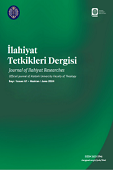Ebû Reşîd en-Nisâbûrî’nin Mu‘tezile Mezhebindeki Yeri ve Ekol İçerisindeki Polemiklere Yaklaşımı
Abū Rashīd al-Nisābūrī's Place in the Mu'tazilite School and His Approach to the Polemics within the School
Author(s): Edip Yılmaz, Mehmet Zeki İşcanSubject(s): Education, Islam studies, Sociology of Education, Sociology of Religion, Psychology of Religion
Published by: Atatürk Üniversitesi İlahiyat Fakültesi
Keywords: History of Islamic Sects; Muʿtazila; al-Nīsābūrī; Sarfa; Baṣra School; Baghdād School;
Summary/Abstract: In this paper, we have examined the position of Abū Rashīd al-Nīsābūrī in the school of Muʿtazila and his approach to the polemics within the school. He was one of the prominent students of Qāḍī ʿAbd al-Jabbār and assumed the leadership of Muʿtazila of Basra after the death of his teacher. Although there is not much information about his life in the sources, it is reported that he belonged to the Baghdād school in the early years of his life and was influenced by the views of Abū’l-Ḳāsim al-Balkhī, who had a great reputation in the Khorasan region. In his surviving works, which are written from the perspective of the Basra school, he continues to refer to al-Balkh̲̲ī's views extensively. The fact that he belonged to the Baghdād school in the early years of his life and later became a member of the Basra school gave him the opportunity to get to know both schools closely. Based on this experience, he wrote a work on the polemics between the two schools and defended the views of Abū Hāshim al-Jubbāʾī against the Baghdād Mu‘tazilites. When we closely examine al-Nīsābūrī's views, we can say that he preserved the Mu‘tazilite point of view to a great extent during the period of the Buwayhids when Shiite tendencies started within the Muʿtazila. Instead of presenting different ideas and approaches, he tried to make the Mu‘tazilite heritage more systematic and understandable by following the path of his teacher. He also put forward some unique approaches. In particular, he criticized early Mu‘tazilite thinkers such as al-Naẓẓām on the issue of sarfa and took an attitude close to the general Sunni view. As al-Shahrastānī states, it is possible to see this close positioning of the Basra Mu'tazilites to Sunni thought in al-Nīsābūrī's views on prophethood and miracles. In our study, using the documentation technique, al-Nīsābūrī's works that have survived both in manuscript and printed form have been identified. These works were analyzed through content analysis and the results were evaluated.
Journal: İlahiyat Tetkikleri Dergisi
- Issue Year: 2024
- Issue No: 61
- Page Range: 92-105
- Page Count: 14
- Language: Turkish

